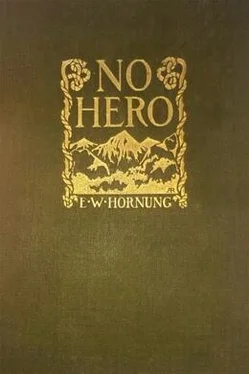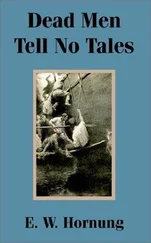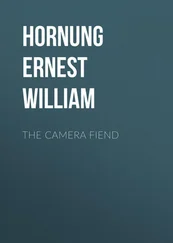E. Hornung - No Hero
Здесь есть возможность читать онлайн «E. Hornung - No Hero» весь текст электронной книги совершенно бесплатно (целиком полную версию без сокращений). В некоторых случаях можно слушать аудио, скачать через торрент в формате fb2 и присутствует краткое содержание. Год выпуска: 2017, Издательство: epubBooks Classics, Жанр: Классический детектив, на английском языке. Описание произведения, (предисловие) а так же отзывы посетителей доступны на портале библиотеки ЛибКат.
- Название:No Hero
- Автор:
- Издательство:epubBooks Classics
- Жанр:
- Год:2017
- ISBN:нет данных
- Рейтинг книги:5 / 5. Голосов: 1
-
Избранное:Добавить в избранное
- Отзывы:
-
Ваша оценка:
- 100
- 1
- 2
- 3
- 4
- 5
No Hero: краткое содержание, описание и аннотация
Предлагаем к чтению аннотацию, описание, краткое содержание или предисловие (зависит от того, что написал сам автор книги «No Hero»). Если вы не нашли необходимую информацию о книге — напишите в комментариях, мы постараемся отыскать её.
.’
No Hero — читать онлайн бесплатно полную книгу (весь текст) целиком
Ниже представлен текст книги, разбитый по страницам. Система сохранения места последней прочитанной страницы, позволяет с удобством читать онлайн бесплатно книгу «No Hero», без необходимости каждый раз заново искать на чём Вы остановились. Поставьте закладку, и сможете в любой момент перейти на страницу, на которой закончили чтение.
Интервал:
Закладка:
She did not rise. She did not look at me again. But I saw the tears standing in her eyes, one I saw roll down her cheek, and the sight smote me harder than her hardest word, though more words followed in broken whispers.
"It wasn't because I cared … that you hurt me as you did. I never did care for him … like that. It was … because … you seemed to think my society contamination … to an honest boy. I did care for him, but not like that. I cared too much for him to let him marry me … to contaminate him for life!"
I repudiated the reiterated word with all my might. I had never used it, even in my thoughts; it had never once occurred to me in connection with her. Had I not shown as much? Had I behaved as though I feared contamination for myself? I rapped out these questions with undue triumph, in my heat, only to perceive their second edge as it cut me to the quick.
"But you were playing a part," retorted Mrs. Lascelles. "You don't deny it. Are you proud of it, that you rub it in? Or are you going to begin denying it now?"
Unfortunately, that was impossible. Tt was too late for denials. But, driven into my last corner, as it seemed, I relapsed for the moment into thought, and my thoughts took the form of a rapid retrospect of all the hours that this angry woman and I had spent together. I was introduced to her again by poor Bob. I recognised her again by the light of a match, and accosted her next morning in the strong sunshine. We went for our first walk together. We sat together on the green ledge overlooking the glaciers, and first she talked about herself, and then we both talked about Bob, and then Bob appeared in the flesh and gave me my disastrous idea. Then there was the day on the Findelen that we had all three spent together. Then there was the walk home from early church (short as it had been), the subsequent expedition to Zermatt and back, with its bright beginning and its clouded end. Up to that point, at all events, they had been happy hours, so many of them unburdened by a single thought of Bob Evers and his folly, not one of them haunted by the usual sense of a part that is played. I almost wondered as I realised this. I supposed it would be no use attempting to express myself to Mrs. Lascelles, but I felt I must say something before I went, so I said:
"I deny nothing, and I'm proud of nothing, but neither am I quite so ashamed as perhaps I ought to be. Shall I tell you why, Mrs. Lascelles? It may have been an insolent and an infamous part, as you imply; but I enjoyed playing it, and I used often to forget it was a part at all. So much so that even now I'm not so sure that it was one! There—I suppose that makes it all ten times worse. But I won't apologise again. Do you mind giving me that stick?"
I had rested the two of them against the chair between us. Mrs. Lascelles had taken possession of one, with which she was methodically probing the path, for there had been no time to draw their Alpine teeth. She did not comply with my request. She smiled instead.
"I mind very much," her old voice said. "Now we have finished fighting, perhaps you will listen to the Meistersinger —for it is worth listening to on that band—and try to appreciate Baden while you are here. There are no more trains for hours."
The wooded hills rose over the bandstand, against the bright blue sky. The shadow of the colonnade lay sharp and black beyond our feet, with people passing, and the band crashing, in the sunlight beyond. That was Baden. I should not have found it a difficult place to appreciate, a week or so before; even now it was no hardship to sit there listening to the one bit of Wagner that my ear welcomes as a friend, and furtively to watch my companion as she sat and listened too. You will perceive by what train of associations my eyes soon fell upon the Tauchnitz volume which she must have placed without thinking on the chair between us. I took it up. Heavens! It was one of the volumes of Browning's Poems. And back I sped in spirit to a green ledge overlooking the Gorner Glacier, to think what we had said about Browning up there, but only to remember how I had longed to be to Mrs. Lascelles what Catherine Evers had been to me. There were some sharp edges to the reminiscence, but I turned the pages while they did their worst, and so cut myself to the heart upon a sharper than them all. It was in a poem I remembered, a poem whose title pained me into glancing farther. And see what leapt to meet me from the printed page:
"And I,—what I seem to my friend, you see:
What I soon shall seem to his love, you guess:
What I seem to myself, do you ask of me?
No hero, I confess."
True, too true; no hero, indeed; anything in the wide world else! But that I should read it there by the woman's side! And yet, even that was no such coincidence; had we not talked about the poet, had I not implied what Catherine thought of him, what everybody ought to think?
Of a sudden a strange thrill stirred me; sidelong I glanced at my companion. She had turned her head away; her cheek was deeply dyed. She knew what I was doing; she might divine my thoughts. I shut the book lest she should see the vile title of a thing I had hitherto liked. And the Prizelied crashed back into the ear.
Chapter XIII
Number Three
It was the middle of November when I was shown once more into the old room at the old number in Elm Park Gardens. There was a fire, the windows were shut, and the electric light was a distinct improvement when the maid put it on; otherwise all was exactly as I had left it in August, and so often pictured it since. There was "Hope," presiding over the shelf of poets, and here "Paolo and Francesca," reminiscent as ever of Melbury Road, upon a wet Sunday, years and years ago. The day's Times and the week's Spectator were not less prominent than the last new problem novel; all three lay precisely where their predecessors had always lain; and my own dead self stood in its own old place upon the piano which had been in St. Helena with Napoleon. It is vanity's deserts to come across these unnecessary memorials of a decently buried boyhood; there is always something stultifying about them, and I longed to confiscate this one of me.
But there was a photograph on the chimney–piece that interested me keenly; it was evidently the very latest of Bob Evers, and I studied it with a painful curiosity. Was the boy really altered, or did I only imagine it from my secret knowledge of his affairs? To me he seemed graver, more sedate, less angelically trustful in expression, and yet something finer and manlier withal: to confirm the idea one had only to compare this new one with the racket photograph now relegated to a rear rank. The round–eyed look was gone. Had I here yet another memorial of yet another buried boyhood? If so, I felt I was the sexton, and I might be ashamed, and I was.
"Looking at Bob? Isn't it a dear one of him? You see—he is none the worse!"
And Catherine Evers stood smiling as warmly, as gratefully, as she grasped my hand; but with her warmth there was a certain nervousness of manner, which had the odd effect of putting me perversely at my ease; and I found myself looking critically at Catherine, really critically, for I suppose the first time in my life.
"He is playing foot–ball," she continued, full as ever of her boy. "I had a letter from him only this morning. He had his colours at Eton, you know (he had them for everything there), but he never dreamt of getting them at Cambridge, yet now he really thinks he has a chance! They tried him the other day, and he kicked a goal. Dear old Bob! If he does get them he will be a Blue and a half, he says. He writes so happily, Duncan! I have so much to be thankful for—to thank you for!"
Yes, Catherine was good to look at; there was no doubt of it; and this time she was not wearing any hat. Discoursing of the lad, she was animated, eager, for once as exclamatory as her pen, with light and life in every look of the thin intellectual face, in every glance of the large, intellectual eyes, and in every intonation of the keen dry voice. A sweet woman; a young woman; a woman with a full heart of love and sympathy and tenderness—for Bob! Yet, when she thanked me at the end, either upon an impulse, or because she thought she must, her eyes fell, and again I detected that slight embarrassment which was none the less a revelation, to me, in Catherine Evers, of all women in the world.
Читать дальшеИнтервал:
Закладка:
Похожие книги на «No Hero»
Представляем Вашему вниманию похожие книги на «No Hero» списком для выбора. Мы отобрали схожую по названию и смыслу литературу в надежде предоставить читателям больше вариантов отыскать новые, интересные, ещё непрочитанные произведения.
Обсуждение, отзывы о книге «No Hero» и просто собственные мнения читателей. Оставьте ваши комментарии, напишите, что Вы думаете о произведении, его смысле или главных героях. Укажите что конкретно понравилось, а что нет, и почему Вы так считаете.










